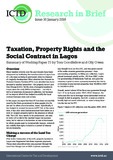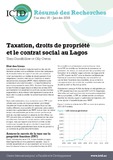Taxation, Property Rights and the Social Contract in Lagos: Summary of Working Paper 73
Taxation, droits de propriété et le contrat social au Lagos
| dc.contributor.author | Goodfellow, Tom | |
| dc.contributor.author | Owen, Olly | |
| dc.date.accessioned | 2018-02-05T14:18:59Z | |
| dc.date.available | 2018-02-05T14:18:59Z | |
| dc.date.issued | 2018-01 | |
| dc.identifier.citation | Goodfellow, T. and Owen, O (2018) Taxation, Property Rights and the Social Contract in Lagos, ICTD Research in Brief, Brighton: IDS | en |
| dc.identifier.citation | Goodfellow, T. et Owen, O. (2018) Taxation, droits de propriété et le contrat social au Lagos Résumé des Recherches 16, Brighton: IDS | fr |
| dc.identifier.uri | https://opendocs.ids.ac.uk/opendocs/handle/20.500.12413/13538 | |
| dc.description.abstract | This ICTD Research in Brief is a two-page summary of ICTD Working Paper 73 by Tom Goodfellow and Olly Owen. This series is aimed at policy makers, tax administrators, fellow researchers and anyone else who is big on interest and short on time. Major taxation reforms over the past decade have been interpreted as facilitating the transformation of Lagos from of a city seen as in permanent ‘crisis’ to a beacon of ‘megacity development’. Most attention has focused on Personal Income Taxation (PIT). Less attention has been devoted to another innovation – the property tax or Land Use Charge (LUC). Yet the story of property taxation in Lagos since the early 2000s is important not only in terms of enormous increases in collection, but because of the ways in which it has helped to solidify the ‘fiscal contract’ between state and society. | en |
| dc.description.abstract | Ce résumé de recherches de l’ICTD est une synthèse de deux pages du document de travail 73 par Tom Goodfellow et Olly Owen. Cette série s'adresse aux décideurs politiques, aux administrateurs fiscaux, aux collègues chercheurs et à toute autre personne qui est intéressée mais qui n’a pas beaucoup de temps. Les réformes de taxation majeures ayant eu lieu ces dix dernières années sont considérées comme des catalyseurs de la transformation de Lagos d’une ville vue comme en ‘crise’ permanente à un modèle de développement d’une mégalopole. L’accent a été mis sur l’impôt sur le revenu des personnes physiques (IRPP). Moins d’attention a été consacrée à une autre innovation – la taxe foncière et la taxe sur la propriété foncière (TPF). Pourtant l’historique de la taxe foncière à Lagos depuis le début des années 2000 est importante non seulement du point de vue des énormes augmentations de la collecte mais également à cause de la façon dont il a aidé à solidifier ‘le contrat fiscal’ entre l’état et la société. | fr |
| dc.description.sponsorship | Department for International Development | en |
| dc.description.sponsorship | Bill and Melinda Gates Foundation | en |
| dc.language.iso | en | en |
| dc.publisher | IDS | en |
| dc.relation.ispartofseries | ICTD Research in Brief;16 | |
| dc.rights.uri | http://www.ids.ac.uk/files/dmfile/IDSOpenDocsStandardTermsOfUse.pdf | en |
| dc.subject | Governance | en |
| dc.title | Taxation, Property Rights and the Social Contract in Lagos: Summary of Working Paper 73 | en |
| dc.title | Taxation, droits de propriété et le contrat social au Lagos | fr |
| dc.type | Series paper (IDS) | en |
| dc.rights.holder | © Institute of Development Studies, 2018 | en |
| dc.identifier.externaluri | http://www.ictd.ac/publication/7-policy-briefing/203-taxation-property-rights-and-the-social-contract-in-lagos | en |
| dc.identifier.team | Governance | en |
| rioxxterms.version | NA | en |


